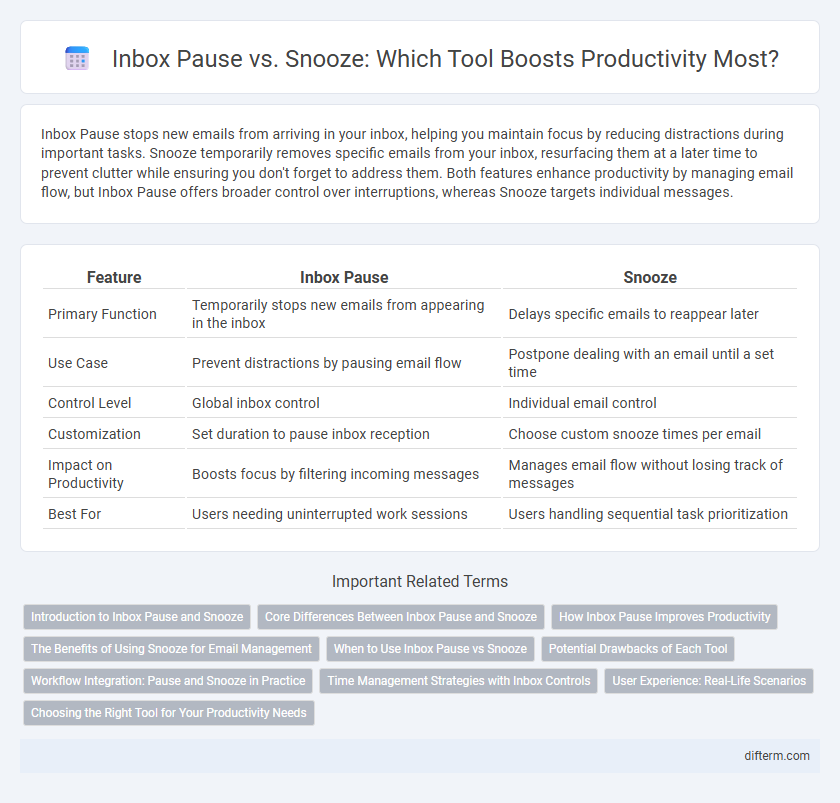Inbox Pause stops new emails from arriving in your inbox, helping you maintain focus by reducing distractions during important tasks. Snooze temporarily removes specific emails from your inbox, resurfacing them at a later time to prevent clutter while ensuring you don't forget to address them. Both features enhance productivity by managing email flow, but Inbox Pause offers broader control over interruptions, whereas Snooze targets individual messages.
Table of Comparison
| Feature | Inbox Pause | Snooze |
|---|---|---|
| Primary Function | Temporarily stops new emails from appearing in the inbox | Delays specific emails to reappear later |
| Use Case | Prevent distractions by pausing email flow | Postpone dealing with an email until a set time |
| Control Level | Global inbox control | Individual email control |
| Customization | Set duration to pause inbox reception | Choose custom snooze times per email |
| Impact on Productivity | Boosts focus by filtering incoming messages | Manages email flow without losing track of messages |
| Best For | Users needing uninterrupted work sessions | Users handling sequential task prioritization |
Introduction to Inbox Pause and Snooze
Inbox Pause temporarily stops new email from arriving in your inbox, reducing distractions and allowing for focused work sessions. Snooze delays specific emails, removing them from view until a chosen later time, helping prioritize tasks without losing track of important messages. Both tools optimize email management by controlling interruptions and enhancing productivity.
Core Differences Between Inbox Pause and Snooze
Inbox Pause halts the delivery of all incoming emails to the inbox, allowing users to focus exclusively on current tasks without new distractions. Snooze temporarily removes selected emails from the inbox, resurfacing them at a chosen later time to address. The core difference lies in Inbox Pause controlling overall email flow, while Snooze manages individual email timing for better task organization.
How Inbox Pause Improves Productivity
Inbox Pause improves productivity by temporarily halting the flow of incoming emails, allowing uninterrupted focus on critical tasks without the distraction of new messages. Unlike Snooze, which merely delays email notifications, Inbox Pause prevents accumulation of cognitive interruptions, leading to enhanced concentration and efficient time management. Studies show that controlling email influx with Inbox Pause can reduce task-switching costs and increase overall work output.
The Benefits of Using Snooze for Email Management
Snooze in email management allows users to temporarily remove messages from their inbox and resurface them at a later, more convenient time, enhancing focus and reducing distraction. By scheduling emails to reappear closer to their relevance or deadline, individuals can prioritize urgent tasks without losing track of less immediate communications. This method supports maintaining a cleaner inbox and promotes better time management, resulting in improved productivity and reduced stress levels.
When to Use Inbox Pause vs Snooze
Inbox Pause is ideal for blocking all incoming emails temporarily to maintain deep focus during critical work periods without interruptions. Snooze works best when you want to defer specific non-urgent emails to a later time while still receiving other important messages. Using Inbox Pause preserves overall productivity by managing email flow, whereas Snooze helps prioritize tasks by delaying select conversations.
Potential Drawbacks of Each Tool
Inbox Pause can lead to missed urgent communications, causing delays in critical decision-making processes. Snooze might clutter your email workflow by temporarily hiding important messages that accumulate and overwhelm you later. Both tools risk disrupting timely responses, but Inbox Pause halts flow entirely while Snooze only postpones engagement.
Workflow Integration: Pause and Snooze in Practice
Inbox Pause halts new email notifications, creating uninterrupted focus periods that enhance deep work and minimize distractions. Snooze temporarily removes emails from the inbox, resurging them at a scheduled time to align with planned workflow tasks, preventing inbox clutter. Combining Pause and Snooze ensures seamless workflow integration by balancing real-time focus with organized task management, optimizing productivity.
Time Management Strategies with Inbox Controls
Inbox Pause temporarily stops new email notifications, reducing distractions and allowing for focused work blocks, while Snooze delays specific emails to a later time, managing tasks without halting the entire inbox flow. Both features enhance time management by prioritizing attention and organizing email responses efficiently. Employing Inbox Pause with scheduled periods for email review and using Snooze for non-urgent messages optimizes productivity and minimizes cognitive overload.
User Experience: Real-Life Scenarios
Inbox Pause enhances user experience by halting incoming emails to prevent distractions during focused work sessions, ideal for deep concentration tasks. Snooze allows users to temporarily remove specific emails from the inbox, resurfacing them at a chosen time, which suits managing time-sensitive follow-ups without losing track. Both features improve productivity by customizing email flow control to match individual workflow and priority needs.
Choosing the Right Tool for Your Productivity Needs
Inbox Pause and Snooze serve distinct productivity purposes: Inbox Pause halts new email arrivals to minimize distractions and foster deep focus, while Snooze temporarily hides specific messages, resurfacing them when you're ready to address them. Choosing the right tool depends on your workflow--Inbox Pause suits tasks requiring uninterrupted concentration, whereas Snooze helps manage time-sensitive emails without losing track of important follow-ups. Integrating both features strategically can optimize email management and enhance overall productivity.
Inbox Pause vs Snooze Infographic

 difterm.com
difterm.com